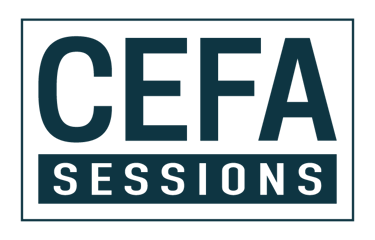Join the 3-day CEFA2025 Professional Retreat
Artificial Intelligence and the Future of Circular Economy
1. Smarter recycling with AI
Imagine waste bins that think for themselves! Thanks to AI and smart sensors, materials can now be sorted and given a value with incredible precision. How can we ensure these systems optimize collection routes, save time, cut fuel use, and reduce emissions — all while recovering more valuable materials?
2. Digital Product Passports (DPPs)
What if every product came with its own “digital story”? DPPs make that possible — showing where a product comes from, what it’s made of, and how it can be repaired, reused, or recycled. Are we ready to comply with this new trend?
3. Blockchain for trust and traceability
Blockchain technology adds another layer of confidence. By securely tracking every step of a product’s life — from raw material to upcycling — blockchain ensures that sustainability claims are real, not just talk. Can we really build trust between producers, consumers, while protecting the environment?
Transitioning Toward Circular Business Models
1. Products as a Service (PaaS)
Why buy when you can use smarter? Instead of owning a product, customers can subscribe to use it — whether it’s electronics, tools, or even furniture. Is it true that this approach motivates companies to design products that last longer, can be repaired easily, and deliver great performance over time?
2. Refurbishment and Re-manufacturing
Old doesn’t mean obsolete. More companies are giving products a second life — repairing, upgrading, and reselling them like new. From phones to industrial equipment, this practice saves energy, reduces emissions, and creates jobs. But does this instill circular economy?
3. Reverse Logistics and Take-Back Programs
Imagine a world where products don’t end up in landfills but return to the company that made them — ready to be repaired, reused, or upcycled. How much can we achieve through reverse logistics?
1. Bio-based and Modular Materials
Nature is becoming our new factory. From algae and fungi to agricultural waste, scientists and designers are creating new materials that replace plastics and reduce dependence on fossil fuels. Is there a future for a circular bio-economy?
2. Designed for Durability and Disassembly
Products of the future are built to last — and to be easily fixed. Modular design makes it simple to repair or upgrade items instead of throwing them away. It also ensures valuable components can be recovered at the end of their use cycle. Are we really intentionally designing for circularity?
3. Next-Generation Recycling
Recycling is evolving fast. Beyond mechanical methods, new chemical and enzymatic recycling technologies can break materials down to their basic molecules — allowing plastics, textiles, and other materials to be recycled again and again without losing quality. Will this brings us closer to a world of truly infinite material loops?
Circular Product Design & Material Innovation
This year's themes...
Sign up, Pay, and secure your spot
**Please note that the REGISTRATION does not include domestic or international (air)-travel costs to attend the 1-day SCE Introduction Course at CEFA2025. If you are locally based, we recommend taking a taxi or a sharing platform service (uber, cabify, or other) as there is limited parking space at the venue. Thanks in advance for your understanding and cooperation.
3-day CEFA2025 Retreat (Business/Organization)
Date: Tuesday, 02 December 2025 to Thursday, 04 December 2025
Location: Km 27 Via Las Palmas VDA Los Salados URB Ziruma CA 121
**Arrival date is 01 December 2025 after 3PM.
Cost:
Before October 17, 2025: COP4.250.000 (Colombian Pesos) IVA included, for 1 person.
Prior to October 31, 2025: COP4.500.000 (Colombian Pesos) IVA included, for 1 person.
Prior to November 28, 2025: COP4.750.000 (Colombian Pesos) IVA included, for 1 person.
Registration includes:
Full access to all programmed spaces, including welcome reception, workshops, discussion panels, press briefing, podcasts sessions, social meetings and other venue spaces, during the full 3-day program;
3-night shared sleeping accommodation (including towels) at the CEFA2025 venue with daily cleaning services, including daily breakfast, lunch, and dinner (vegetarian options available); with coffee and snacks station available throughout the day;
Scheduled pick-up and ground transport for the route international airport “Jose Maria Cordova”-to-venue (on arrival day) and route venue-to-international airport “Jose Maria Cordova” (on departure day);
Access and use of all venue amenities, including high-speed wifi, co-working spaces, gym, jacuzzi, fire-pit, and other amenities;
Opportunity to schedule one-on-one meetings with senior circular economy experts and other invitees to specifically discuss your companies’ needs and interests;
Access to copies of edited audio-visual recorded material captured during CEFA2025;
Certificate of Participation at CEFA2025; and
Access to this unique intimate professional ecosystem to make personal connections, participate in high-level content discussions and learn about the value and relevance of circular economy inspired solutions and tools for your professional career and business.


